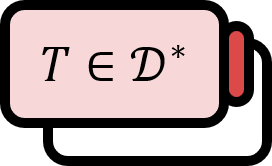Proving that All Locally Integrable Functions Can Be Extended to Distributions
Theorem1
For every $u \in L_{\mathrm{loc} }^1(\Omega) $, there exists a distribution $T_{u} \in D^{\ast}(\Omega)$ defined as follows:
$$ T_{u} (\phi) := \int_{\Omega} u(x)\phi (x)dx, \quad \phi \in D(\Omega) $$
Description
$\mathcal{D}(\Omega)$ is the space of test functions. The distribution defined as above is called a regular distribution. Moreover, the above expression can be regarded as the inner product of $u$ and $\phi$ from the viewpoint of inner product spaces, hence it can also be denoted as follows.
$$ T_{u}(\phi)=\langle u , \phi \rangle $$
According to the theorem above, locally integrable functions can be treated as if they were distributions. Calling a distribution a generalized function also stems from this rationale.
Proof
To show that $T_{u}$ defined as above is a distribution, we must prove that it is a continuous and linear functional. Being linear is evident since it is defined by integration, so we just need to demonstrate continuity. Remember, continuity here means continuity with respect to the convergence in the space of test functions.
Let’s assume $\phi_{j} \rightarrow \phi\ \ \mathrm{in}\ D(\Omega)$. Then by the definition of convergence, there exists $K \Subset\Omega$ as follows.
$$ \mathrm{supp}(\phi_{j}-\phi) \subset K\quad \forall\ j $$
Since $u$ is locally integrable, the following equation holds for $M>0$.
$$ \begin{align*} \left| T_{u}(\phi_{j})-T_{u}(\phi) \right| &= \left| \int_{K} u(x)\left( \phi_{j}(x) -\phi (x) \right) dx \right| \\ & \le \sup \limits_{x\in K} \left| \phi_{j} (x) - \phi (x) \right| \int_{K} |u(x)|dx \\ &\le \sup \limits_{x\in K} \left| \phi_{j} (x) - \phi (x) \right|M \end{align*} $$
Given the assumption that $\phi_{j}(x) \rightrightarrows \phi (x)$, the following holds.
$$ \sup \limits_{x\in K} \left| \phi_{j} (x) - \phi (x) \right|M \to 0 \quad \text{as } j \rightarrow \infty $$
Therefore, the following is true.
$$ T_{u}( \phi_{j} ) \rightarrow T_{u}(\phi) \quad \text{as } j \rightarrow \infty $$
Thus, $T_{u}$ is continuous in $\mathcal{D}$.
■
It would be convenient if all distributions were of the form described above, but unfortunately, that is not the case.
Robert A. Adams and John J. F. Foutnier, Sobolev Space (2nd Edition, 2003), p20-21 ↩︎
